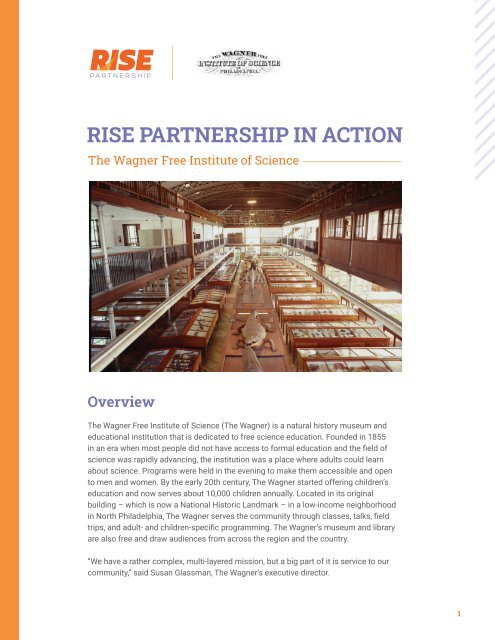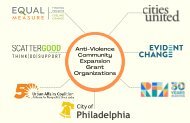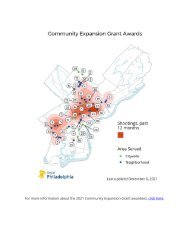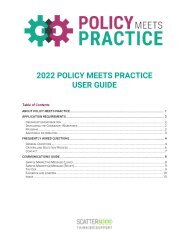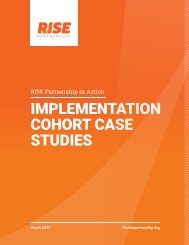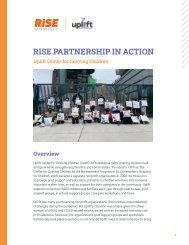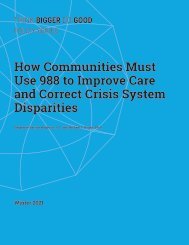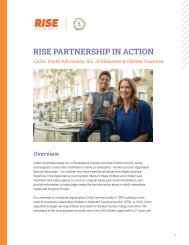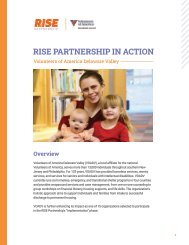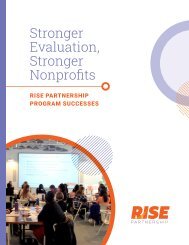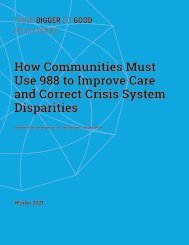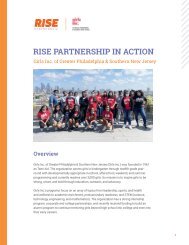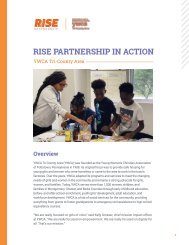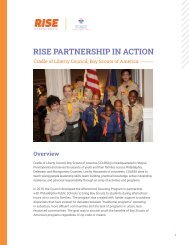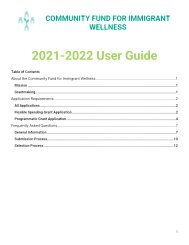RISE Partnership in Action: The Wagner Free Institute of Science
Create successful ePaper yourself
Turn your PDF publications into a flip-book with our unique Google optimized e-Paper software.
<strong>RISE</strong> PARTNERSHIP IN ACTION<br />
<strong>The</strong> <strong>Wagner</strong> <strong>Free</strong> <strong>Institute</strong> <strong>of</strong> <strong>Science</strong><br />
Overview<br />
<strong>The</strong> <strong>Wagner</strong> <strong>Free</strong> <strong>Institute</strong> <strong>of</strong> <strong>Science</strong> (<strong>The</strong> <strong>Wagner</strong>) is a natural history museum and<br />
educational <strong>in</strong>stitution that is dedicated to free science education. Founded <strong>in</strong> 1855<br />
<strong>in</strong> an era when most people did not have access to formal education and the field <strong>of</strong><br />
science was rapidly advanc<strong>in</strong>g, the <strong>in</strong>stitution was a place where adults could learn<br />
about science. Programs were held <strong>in</strong> the even<strong>in</strong>g to make them accessible and open<br />
to men and women. By the early 20th century, <strong>The</strong> <strong>Wagner</strong> started <strong>of</strong>fer<strong>in</strong>g children’s<br />
education and now serves about 10,000 children annually. Located <strong>in</strong> its orig<strong>in</strong>al<br />
build<strong>in</strong>g – which is now a National Historic Landmark – <strong>in</strong> a low-<strong>in</strong>come neighborhood<br />
<strong>in</strong> North Philadelphia, <strong>The</strong> <strong>Wagner</strong> serves the community through classes, talks, field<br />
trips, and adult- and children-specific programm<strong>in</strong>g. <strong>The</strong> <strong>Wagner</strong>’s museum and library<br />
are also free and draw audiences from across the region and the country.<br />
“We have a rather complex, multi-layered mission, but a big part <strong>of</strong> it is service to our<br />
community,” said Susan Glassman, <strong>The</strong> <strong>Wagner</strong>’s executive director.<br />
1
“ We’ve been th<strong>in</strong>k<strong>in</strong>g for several years about how<br />
we could do a different, more authentic k<strong>in</strong>d <strong>of</strong><br />
evaluation. So when we learned about the <strong>RISE</strong><br />
opportunity, we jumped on it.<br />
Susan Glassman, executive director at<br />
<strong>The</strong> <strong>Wagner</strong> <strong>Free</strong> <strong>Institute</strong> <strong>of</strong> <strong>Science</strong><br />
One <strong>of</strong> the <strong>in</strong>stitution’s longest-stand<strong>in</strong>g<br />
children’s programs is GeoKids, an<br />
<strong>in</strong>tensive science education program<br />
for children <strong>in</strong> the community. <strong>The</strong><br />
<strong>Wagner</strong> currently partners with five<br />
neighborhood elementary schools to<br />
<strong>of</strong>fer the program, which consists <strong>of</strong><br />
year-long classroom teach<strong>in</strong>g, museum<br />
tours, and field trips to local outdoor<br />
spaces. GeoKids has expanded to<br />
<strong>in</strong>clude SNAP (<strong>Science</strong> Nature Art <strong>in</strong><br />
Philadelphia), a similar program for<br />
middle schoolers.<br />
“It’s really about be<strong>in</strong>g place-based<br />
and show<strong>in</strong>g them this natural history<br />
museum is <strong>in</strong> your neighborhood and<br />
connect<strong>in</strong>g them to nature and science<br />
and empower<strong>in</strong>g them to participate <strong>in</strong><br />
all those th<strong>in</strong>gs,” said Holly Clark, director<br />
<strong>of</strong> children’s education at <strong>The</strong> <strong>Wagner</strong>.<br />
<strong>The</strong> <strong>Wagner</strong> is further enhanc<strong>in</strong>g its<br />
impact as one <strong>of</strong> 15 organizations<br />
selected to participate <strong>in</strong> the <strong>RISE</strong><br />
<strong>Partnership</strong>’s “Implementation” phase.<br />
<strong>The</strong> <strong>Wagner</strong>’s work with <strong>RISE</strong> started<br />
with GeoKids, and subsequently<br />
logic models, surveys, and program<br />
evaluations were also developed for<br />
SNAP and some <strong>of</strong> the adult programs.<br />
<strong>The</strong> museum always had anecdotal<br />
evidence from students, families, and<br />
community members about the value<br />
<strong>of</strong> its programs, but work<strong>in</strong>g with <strong>RISE</strong><br />
helped to quantify impact.<br />
“It’s k<strong>in</strong>d <strong>of</strong> hard to measure impact or<br />
quantify th<strong>in</strong>gs because we’re not do<strong>in</strong>g<br />
a standardized test so it’s hard to say,<br />
‘what did the kids learn?’” Clark said.<br />
“[<strong>RISE</strong>] has given us a concrete way to<br />
quantify the outcomes and focus the<br />
outcomes and measure the impacts.”<br />
<strong>The</strong> <strong>in</strong>stitution has long collected data<br />
on program satisfaction, but now has<br />
the tools, language, and questions to<br />
capture what people are learn<strong>in</strong>g from<br />
programs. For example, <strong>The</strong> <strong>Wagner</strong><br />
has completely retooled the surveys<br />
given to students <strong>in</strong> the adult education<br />
classes, ask<strong>in</strong>g them for the first time if<br />
the class has had an impact on the way<br />
they understand science, the scientific<br />
process, or protocols.<br />
“We’ve been th<strong>in</strong>k<strong>in</strong>g for several years<br />
about how we could do a different,<br />
more authentic k<strong>in</strong>d <strong>of</strong> evaluation,” said<br />
Glassman. “So when we learned about<br />
the <strong>RISE</strong> opportunity, we jumped on it.”<br />
2
“ Before <strong>RISE</strong>, we made surveys, but we didn’t really<br />
make them like we should have; we didn’t consider<br />
pilot<strong>in</strong>g surveys or us<strong>in</strong>g validated questions, among<br />
other th<strong>in</strong>gs.<br />
Holly Clark, director <strong>of</strong> children’s education at<br />
<strong>The</strong> <strong>Wagner</strong> <strong>Free</strong> <strong>Institute</strong> <strong>of</strong> <strong>Science</strong><br />
Because <strong>of</strong> the COVID-19 pandemic,<br />
<strong>The</strong> <strong>Wagner</strong> was forced to shut its<br />
physical doors and pivot to virtual<br />
programm<strong>in</strong>g. <strong>RISE</strong> helped the museum<br />
navigate pandemic-related challenges<br />
surround<strong>in</strong>g data collection and work<strong>in</strong>g<br />
with m<strong>in</strong>ors, support<strong>in</strong>g the Philadelphia<br />
School District’s Institutional Review<br />
Board approval process to allow the<br />
collection <strong>of</strong> evaluation surveys from<br />
teachers and students.<br />
“Before <strong>RISE</strong>, we made surveys, but we<br />
didn’t really make them like we should<br />
have; we didn’t consider pilot<strong>in</strong>g surveys<br />
or us<strong>in</strong>g validated questions, among<br />
other th<strong>in</strong>gs,” said Clark.<br />
Learn<strong>in</strong>gs from <strong>RISE</strong> were also applied<br />
to <strong>in</strong>form the museum’s reopen<strong>in</strong>g<br />
strategy. <strong>The</strong> <strong>Wagner</strong> took seriously<br />
the idea <strong>of</strong> feedback loops – collect<strong>in</strong>g<br />
feedback and us<strong>in</strong>g it to shape and<br />
design programs – and created both a<br />
focus group and survey to understand<br />
visitors’ comfort levels and needs.<br />
This resulted <strong>in</strong> a careful, targeted, and<br />
responsive reopen<strong>in</strong>g.<br />
“We put the feedback loops to<br />
immediate use <strong>in</strong> a very practical<br />
way,” said Glassman. “We’re more<br />
targeted <strong>in</strong> our program design, but<br />
also <strong>in</strong>corporat<strong>in</strong>g more voices and<br />
perspectives <strong>in</strong> how we do it.”<br />
<strong>RISE</strong> helped develop a culture <strong>of</strong><br />
evaluation at <strong>The</strong> <strong>Wagner</strong>. Not only did<br />
evaluation move beyond the orig<strong>in</strong>al<br />
GeoKids program, but evaluation<br />
3
pr<strong>in</strong>ciples like creat<strong>in</strong>g logic models,<br />
build<strong>in</strong>g staff buy-<strong>in</strong>, and especially<br />
engag<strong>in</strong>g stakeholders became <strong>in</strong>fused<br />
throughout the <strong>in</strong>stitution.<br />
“We’ve engaged with the partners<br />
on a different level and I th<strong>in</strong>k that’s<br />
resonated with them, even the kids and<br />
the teachers to be <strong>in</strong>volved <strong>in</strong> that,” said<br />
Clark. “We realized <strong>in</strong>volv<strong>in</strong>g them <strong>in</strong><br />
plann<strong>in</strong>g early on and gett<strong>in</strong>g another<br />
po<strong>in</strong>t <strong>of</strong> view could be really <strong>in</strong>formative<br />
and useful.”<br />
“I th<strong>in</strong>k the biggest immediate change<br />
is more voices <strong>in</strong> the mix <strong>in</strong> the creation<br />
and the th<strong>in</strong>k<strong>in</strong>g about program ideas<br />
from the beg<strong>in</strong>n<strong>in</strong>g, <strong>in</strong>stead <strong>of</strong> at the<br />
end,” Glassman added. “It’s a more<br />
dynamic process <strong>of</strong> creat<strong>in</strong>g the<br />
programs or plann<strong>in</strong>g the programs,<br />
even if we’re just ref<strong>in</strong><strong>in</strong>g programs that<br />
already exist.”<br />
Overall, participation <strong>in</strong> <strong>RISE</strong> has been a<br />
very positive learn<strong>in</strong>g experience for the<br />
museum’s leadership and staff.<br />
“I just want to say that it’s the best<br />
pr<strong>of</strong>essional development opportunity I<br />
have ever had personally, but also for my<br />
staff,” said Glassman. “It’s been amaz<strong>in</strong>g.”<br />
Established <strong>in</strong> 2018, <strong>The</strong> <strong>RISE</strong> (Read<strong>in</strong>ess, Implementation, Susta<strong>in</strong>ability for Effectiveness) <strong>Partnership</strong> supports promis<strong>in</strong>g<br />
Greater Philadelphia and Southern New Jersey nonpr<strong>of</strong>it organizations. <strong>The</strong> <strong>RISE</strong> <strong>Partnership</strong> Evaluation Funders Learn<strong>in</strong>g<br />
Community is the first conven<strong>in</strong>g supported by a network <strong>of</strong> funders <strong>in</strong> the region. <strong>The</strong> Learn<strong>in</strong>g Community is a collaborative<br />
effort with the Barra Foundation, Campbell Soup Company, Horner Foundation, Nelson Foundation, Philadelphia Foundation,<br />
PropelNext/Edna McConnell Clark Foundation, Scattergood Foundation, and United Way <strong>of</strong> Greater Philadelphia and Southern<br />
New Jersey, and a partnership with YaleEVAL <strong>of</strong> <strong>The</strong> Consultation Center at Yale. <strong>The</strong> <strong>Partnership</strong> provides nonpr<strong>of</strong>its with<br />
resources and tra<strong>in</strong><strong>in</strong>g to strengthen organizational effectiveness and ensure a greater impact on social, economic, health, and<br />
educational conditions <strong>in</strong> communities, <strong>in</strong>clud<strong>in</strong>g the effects <strong>of</strong> racism, <strong>in</strong>tergenerational poverty and trauma.<br />
For more <strong>in</strong>formation visit therisepartnership.org


